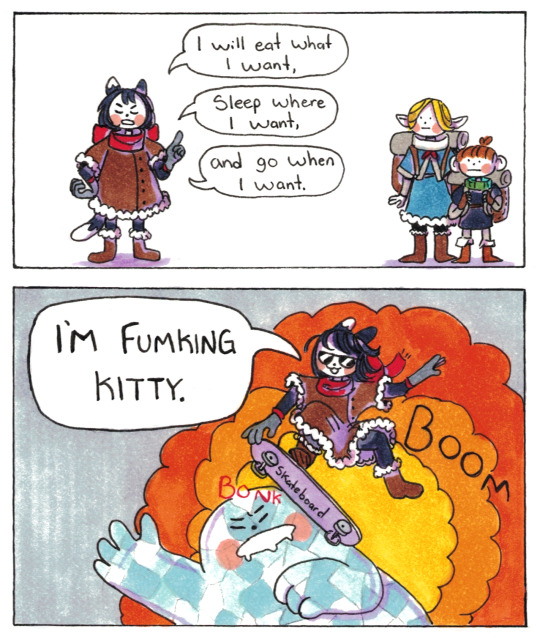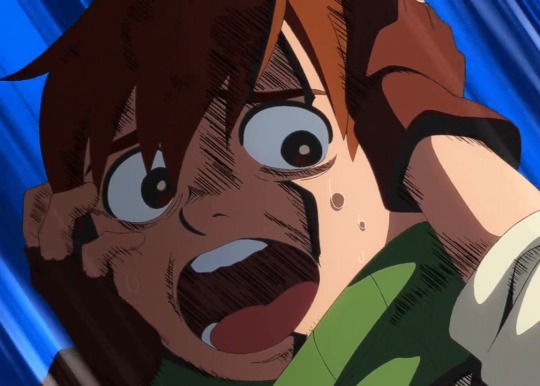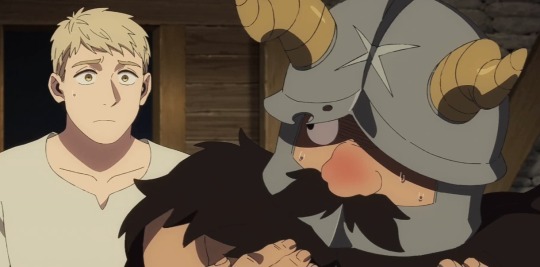#but it works here
Explore tagged Tumblr posts
Text

December 1992. I have mixed feelings about the BATMAN: BIRTH OF THE DEMON graphic novel (summarized previously), but this moment is outstanding.
#comics#batman#birth of the demon#denny o'neil#norm breyfogle#bruce wayne#ra's al ghul#talia#talia al ghul#i don't love breyfogle's art#but it works here#and this scene benefits from the stylization#it would not work nearly as well if drawn by neal adams or some other more literal “heroic realism” artist#batman close-ups
17 notes
·
View notes
Text

5:30am on a Saturday and the post is up? Unheard of.
#fanfic#fanfiction#nonsense#making shit up#steddie#marauders#saturdaycryingclub#archive of our own#teleportation should exist so we can visit each other#getting no sleep because there’s always something to read#sharing filthy fics like they’re candy#virtual candy#here have some free use Reggie on this fine morning#don’t worry he likes it#regulus black can get it#from everyone apparently#starting with Remus#in no scenario would Remus be a virgin#but it works here#because Reggie needs a toy to play with#james potter you sneaky man#someone likes to watch#Steddie living rent free for YEARS#just getting high and getting off#Dear Steve- Eddie wants to fuck you in every timeline#“wanna smoke” = “wanna fuck”#the answer is always yes with these too#every fic -> and than they smash#as it should be
4 notes
·
View notes
Text
when in doubt, baby him
1 note
·
View note
Text
First off, spin this wheel.
You just landed on one of 200 fandoms that have been very popular somewhere on Tumblr over the years. Topics were chosen either from appearing on a @fandom end-of-year recap or from my own long (long, long) site memories before that.
also all of these fandoms are definitely things that really exist in the real world and none of them are Tumblr creations
#polls#tumblr polls#i just know at least one person is going to be like 'frozen? here??' and not even know about constable-frozen#also i tested the spinner link to make sure it worked and got saw loooooooooool
43K notes
·
View notes
Text


i think mabel somehow finds a picture of stan and ford's prom outfits and goes ham recreating the suits for her and dipper's prom
#gravity falls#gf#dipper pines#mabel pines#standford pines#stanley pines#i actually hyperfixated on gf two years ago and tried to execute this concept then#but couldn't get it to look the way i wanted#and here i am two years later#hyperfixated again#and finally finishing this drawing#funny how things work out
22K notes
·
View notes
Text
I fully understand why "character A is astounded at the sight of character B's penis" is a specific kink that gets tagged for, but the fact that some platforms choose to tag this kink as "penis awe" is unintentionally very funny. Now I'm picturing penis experience kink tags for all those other allegedly transcendent emotions in the glossary of your Philosophy 101 textbook. Penis faith. Penis Weltschmerz. Penis apprehension of the absurd.
#media#fandom#fanfic#fanart#humanities#philosophy#tagging#penis mention#penis angst being here omitted because most of this blog's followers already know how that one works
29K notes
·
View notes
Text
something about the way my extremely reactive dangerous patient today is wearing a pride collar...
38K notes
·
View notes
Text
Planet's Fucked: What Can You Do To Help? (Long Post)
Since nobody is talking about the existential threat to the climate and the environment a second Trump term/Republican government control will cause, which to me supersedes literally every other issue, I wanted to just say my two cents, and some things you can do to help. I am a conservation biologist, whose field was hit substantially by the first Trump presidency. I study wild bees, birds, and plants.
In case anyone forgot what he did last time, he gagged scientists' ability to talk about climate change, he tried zeroing budgets for agencies like the NOAA, he attempted to gut protections in the Endangered Species Act (mainly by redefining 'take' in a way that would allow corporations to destroy habitat of imperiled species with no ramifications), he tried to do the same for the Migratory Bird Treaty Act (the law that offers official protection for native non-game birds), he sought to expand oil and coal extraction from federal protected lands, he shrunk the size of multiple national preserves, HE PULLED US OUT OF THE PARIS CLIMATE AGREEMENT, and more.
We are at a crucial tipping point in being able to slow the pace of climate change, where we decide what emissions scenario we will operate at, with existential consequences for both the environment and people. We are also in the middle of the Sixth Mass Extinction, with the rate of species extinctions far surpassing background rates due completely to human actions. What we do now will determine the fate of the environment for hundreds or thousands of years - from our ability to grow key food crops (goodbye corn belt! I hated you anyway but), to the pressure on coastal communities that will face the brunt of sea level rise and intensifying extreme weather events, to desertification, ocean acidification, wildfires, melting permafrost (yay, outbreaks of deadly frozen viruses!), and a breaking down of ecosystems and ecosystem services due to continued habitat loss and species declines, especially insect declines. The fact that the environment is clearly a low priority issue despite the very real existential threat to so many people, is beyond my ability to understand. I do partly blame the public education system for offering no mandatory environmental science curriculum or any at all in most places. What it means is that it will take the support of everyone who does care to make any amount of difference in this steeply uphill battle.
There are not enough environmental scientists to solve these issues, not if public support is not on our side and the majority of the general public is either uninformed or actively hostile towards climate science (or any conservation science).
So what can you, my fellow Americans, do to help mitigate and minimize the inevitable damage that lay ahead?
I'm not going to tell you to recycle more or take shorter showers. I'll be honest, that stuff is a drop in the bucket. What does matter on the individual level is restoring and protecting habitat, reducing threats to at-risk species, reducing pesticide use, improving agricultural practices, and pushing for policy changes. Restoring CONNECTIVITY to our landscape - corridors of contiguous habitat - will make all the difference for wildlife to be able to survive a changing climate and continued human population expansion.
**Caveat that I work in the northeast with pollinators and birds so I cannot provide specific organizations for some topics, including climate change focused NGOs. Scientists on tumblr who specialize in other fields, please add your own recommended resources. **
We need two things: FUNDING and MANPOWER.
You may surprised to find that an insane amount of conservation work is carried out by volunteers. We don't ever have the funds to pay most of the people who want to help. If you really really care, consider going into a conservation-related field as a career. It's rewarding, passionate work.
At the national level, please support:
The Nature Conservancy
Xerces Society for Invertebrate Conservation
Cornell Lab of Ornithology (including eBird)
National Audubon Society
Federal Duck Stamps (you don't need to be a hunter to buy one!)
These first four work to acquire and restore critical habitat, change environmental policy, and educate the public. There is almost certainly a Nature Conservancy-owned property within driving distance of you. Xerces plays a very large role in pollinator conservation, including sustainable agriculture, native bee monitoring programs, and the Bee City/Bee Campus USA programs. The Lab of O is one of the world's leaders in bird research and conservation. Audubon focuses on bird conservation. You can get annual memberships to these organizations and receive cool swag and/or a subscription to their publications which are well worth it. You can also volunteer your time; we need thousands of volunteers to do everything from conducting wildlife surveys, invasive species removal, providing outreach programming, managing habitat/clearing trails, planting trees, you name it. Federal Duck Stamps are the major revenue for wetland conservation; hunters need to buy them to hunt waterfowl but anyone can get them to collect!
THERE ARE DEFINITELY MORE, but these are a start.
Additionally, any federal or local organizations that seek to provide support and relief to those affected by hurricanes, sea level rise, any form of coastal climate change...
At the regional level:
These are a list of topics that affect major regions of the United States. Since I do not work in most of these areas I don't feel confident recommending specific organizations, but please seek resources relating to these as they are likely major conservation issues near you.
PRAIRIE CONSERVATION & PRAIRIE POTHOLE WETLANDS
DRYING OF THE COLORADO RIVER (good overview video linked)
PROTECTION OF ESTUARIES AND SALTMARSH, ESPECIALLY IN THE DELAWARE BAY AND LONG ISLAND (and mangroves further south, everglades etc; this includes restoring LIVING SHORELINES instead of concrete storm walls; also check out the likely-soon extinction of saltmarsh sparrows)
UNDAMMING MAJOR RIVERS (not just the Colorado; restoring salmon runs, restoring historic floodplains)
NATIVE POLLINATOR DECLINES (NOT honeybees. for fuck's sake. honeybees are non-native domesticated animals. don't you DARE get honeybee hives to 'save the bees')
WILDLIFE ALONG THE SOUTHERN BORDER (support the Mission Butterfly Center!)
INVASIVE PLANT AND ANIMAL SPECIES (this is everywhere but the specifics will differ regionally, dear lord please help Hawaii)
LOSS OF WETLANDS NATIONWIDE (some states have lost over 90% of their wetlands, I'm looking at you California, Ohio, Illinois)
INDUSTRIAL AGRICULTURE, esp in the CORN BELT and CALIFORNIA - this is an issue much bigger than each of us, but we can work incrementally to promote sustainable practices and create habitat in farmland-dominated areas. Support small, local farms, especially those that use soil regenerative practices, no-till agriculture, no pesticides/Integrated Pest Management/no neonicotinoids/at least non-persistent pesticides. We need more farmers enrolling in NRCS programs to put farmland in temporary or permanent wetland easements, or to rent the land for a 30-year solar farm cycle. We've lost over 99% of our prairies to corn and soybeans. Let's not make it 100%.
INDIGENOUS LAND-BACK EFFORTS/INDIGENOUS LAND MANAGEMENT/TEK (adding this because there have been increasing efforts not just for reparations but to also allow indigenous communities to steward and manage lands either fully independently or alongside western science, and it would have great benefits for both people and the land; I know others on here could speak much more on this. Please platform indigenous voices)
HARMFUL ALGAL BLOOMS (get your neighbors to stop dumping fertilizers on their lawn next to lakes, reduce agricultural runoff)
OCEAN PLASTIC (it's not straws, it's mostly commercial fishing line/trawling equipment and microplastics)
A lot of these are interconnected. And of course not a complete list.
At the state and local level:
You probably have the most power to make change at the local level!
Support or volunteer at your local nature centers, local/state land conservancy non-profits (find out who owns&manages the preserves you like to hike at!), state fish & game dept/non-game program, local Audubon chapters (they do a LOT). Participate in a Christmas Bird Count!
Join local garden clubs, which install and maintain town plantings - encourage them to use NATIVE plants. Join a community garden!
Get your college campus or city/town certified in the Bee Campus USA/Bee City USA programs from the Xerces Society
Check out your state's official plant nursery, forest society, natural heritage program, anything that you could become a member of, get plants from, or volunteer at.
Volunteer to be part of your town's conservation commission, which makes decisions about land management and funding
Attend classes or volunteer with your land grant university's cooperative extension (including master gardener programs)
Literally any volunteer effort aimed at improving the local environment, whether that's picking up litter, pulling invasive plants, installing a local garden, planting trees in a city park, ANYTHING. make a positive change in your own sphere. learn the local issues affecting your nearby ecosystems. I guarantee some lake or river nearby is polluted
MAKE HABITAT IN YOUR COMMUNITY. Biggest thing you can do. Use plants native to your area in your yard or garden. Ditch your lawn. Don't use pesticides (including mosquito spraying, tick spraying, Roundup, etc). Don't use fertilizers that will run off into drinking water. Leave the leaves in your yard. Get your school/college to plant native gardens. Plant native trees (most trees planted in yards are not native). Remove invasive plants in your yard.
On this last point, HERE ARE EASY ONLINE RESOURCES TO FIND NATIVE PLANTS and LEARN ABOUT NATIVE GARDENING:
Xerces Society Pollinator Conservation Resource Center
Pollinator Pathway
Audubon Native Plant Finder
Homegrown National Park (and Doug Tallamy's other books)
National Wildlife Federation Native Plant Finder (clunky but somewhat helpful)
Heather Holm (for prairie/midwest/northeast)
MonarchGard w/ Benjamin Vogt (for prairie/midwest)
Native Plant Trust (northeast & mid-atlantic)
Grow Native Massachusetts (northeast)
Habitat Gardening in Central New York (northeast)
There are many more - I'm not familiar with resources for western states. Print books are your biggest friend. Happy to provide a list of those.
Lastly, you can help scientists monitor species using citizen science. Contribute to iNaturalist, eBird, Bumblebee Watch, or any number of more geographically or taxonomically targeted programs (for instance, our state has a butterfly census carried out by citizen volunteers).
In short? Get curious, get educated, get involved. Notice your local nature, find out how it's threatened, and find out who's working to protect it that you can help with. The health of the planet, including our resilience to climate change, is determined by small local efforts to maintain and restore habitat. That is how we survive this. When government funding won't come, when we're beat back at every turn trying to get policy changed, it comes down to each individual person creating a safe refuge for nature.
Thanks for reading this far. Please feel free to add your own credible resources and organizations.
#us election#climate change#united states election#resources#native plants#this took 3 hours to write so maybe don't let it flop? i know i write long posts. i know i follow scientists on here#that study birds and corals and other creatures#i realize i did not link sources/resources for everything. i encourage those more qualified to add things on. i need to go to work
18K notes
·
View notes
Text

supple-MENTAL am I right-
I love how fast Jon spiraled between seasons
#his face is not ideal here#not exactly how I see it in my mind#gotta work more on his design me thinks#he gotta look more like a wet cat#tma#tma fanart#tma season one#tma season two#the magnus archives#the magnus archives fanart#tma podcast#jonathan sims#golswia art#golswia#SPIRALed#u see what i did there-
14K notes
·
View notes
Text

License to Kitty.
#dungeon meshi#izutsumi#marcille donato#chilchuk tims#I still stand by my tags on the Izutsumi character study piece I did in January - but I will repeat myself on a few lines here:#I *really* love this character. I love that all of the dungeon meshi crew are complicated and have difficult to love components.#But Izutsumi is a particular kind of hard to love. I foresee a lot of people being turned off by her abrasiveness and lack of teamwork.#She is very self-centered and openly goes against what the party agrees on.#She's a picky eater in a story that is 50% about eating good and healthy food!#It is in part about her growth but admittedly even *then* she remains rather true to her self-centeredness.#Even though she isn't as nice or funny or compassionate as the others...Izutsumi is still someone worth loving.#Even the more difficult people are someone worth loving.#And those people in turn are people who have something and someone they love.#She may be a girlcat but she is the most human of them all.#I hope that if you are an anime only watcher and are feeling put off by her at the moment; you'll give her a chance.#By the way: *yes* I worked very hard to draw that skateboard pose. It was worth it.#EDIT: HAPPY 500th POST OF POORLY-DRAW-MDZS!!! What a comic to commemorate the milestone with!
53K notes
·
View notes
Text

this post is fearmongering. the results of this study are concerning and should definitely be a matter of public discussion, but this is certainly not the conclusion the researchers came to.
the point of the study was to assess the risks of exposure to toxic metals- something one of the co-authors notes are “ubiquitous” fwiw- via menstrual products. Their research confirmed that these metals are indeed present in tampons, but no further conclusions are drawn. it is possible the metal entered into the cotton from the soil, which is a well-known phenomenon; cotton is so good at lifting heavy metals that it has actually been suggested as a part of the solution for revitalizing polluted ground.
the authors conclude with an acknowledgement that the study should be repeated- their sample size was 60 tampons- and a suggestion that further testing ought to be done to indicate whether or not these metals can even leech out of the tampon in the first place, let alone whether or not such leeching could occur at levels deleterious to human health.
there is, in fact, a body of research- too small, for sure, but much larger than this single study- indicating that long-term proper tampon use has no observable negative impact on health. i am grateful and thrilled that more research is being done and i hope that this study is the first of many on this line of questioning, but i am really frustrated at this post and the response it got.
obviously, if this study alters your approach to menstrual health, more power to you. consumers should be informed-risk-takers, and menstrual health is double-obviously a very personal choice. but it definitely wasn't the researchers concluding that you ought to “avoid using tampons at all cost," only this tumblr user did. the lead author of the paper, in fact, specifically says that she hopes people do NOT panic about the results.
(the notes of the post were disappointing. people affirming that they knew they were right to be suspicious of tampons all along, or even recommending alternatives that actually have very little to no research regarding the safety of long-term use, etc. it’s a different conversation, but categorical distrust of tampons is old-school misogyny. you certainly shouldn't wear them if you don’t want to, but there is nothing inherently scary or wrong about them, and people who prefer them are not being reckless or crass.)
((if you're really worried about exposure to heavy metals, you may want to turn a critical eye to fast fashion, as an aside))
#couldn’t reply to the original#so. sorry for the screenshot lol. but i can't put my two cents there. and this topic bugs me (grew up in anti-tampon country)#(Utah)#i do not blindly believe that tampon brands are looking out for us or anything. i hope that comes across here.#anyway. it's something to keep an eye out for more research. i hope this team is able to continue their work
23K notes
·
View notes
Text

endless night
#animal art#animal comic#penguin art#comic art#artists on tumblr#just a comic about emperor penguins#(they are emperor penguins but yellow didn’t go with the colour scheme loool)#(i tried to make it work just trust me lol)#i keep forgetting to upload here woops#sometimes i don’t wanna draw anthros#i’ve been wanting to experiment again#i have a couple pieces planned#but i also wanna do more horror#rlyyyyy hard to decide lmaoooo
54K notes
·
View notes
Text

Grief
ref photo by @jawsstone
#artists on tumblr#my friend let me use a really gorgeous photo they took#it made my brain go brrr#and i had to draw this#i usually take my own reference pics so it was cool to work from someone else's#enjoyed drawing this a lot#despite the subject matter#i saw a pretty scene of a narrow alley#with white stairs stained black from people walking on them#and somehow it took my brain here#grief visits every house
28K notes
·
View notes
Text
Funny things I found out playing with language setting in Netflix while looking episode 15:

Chilchuck's scream sounds HAUNTED in brazilian portuguese. Give it a try if you can.
(You can hear it here)

In spanish dub, Senshi says: "tocó mis senos de hombre", which means "he touched my man boobs" in Spanish. And I think that's the best dub line one so far.
#i love replaying certain scenes (usually screams) to see how they nailed it in other dubs#ive done it with Chilchuck & Mickbell screams because they're the funniest ones#give it a shot if you can#its really funny to hear certain character voices in other languages#for example. brazilian portuguesse gave both mickbell and chilchuck un-childlike voices (in japaneese both sound like little childs)#and they reused Chilchuck's japaneese screams for most of the other languages because he is so high-pitched and full of terror that it work#dungeon meshi#chilchuck#chilchuck tims#dunmeshi#delicious in dungeon#senshi#senshi of izganda#senshi dungeon meshi#idk how do you people screen record the episodes#if i knew how to i would put the shots here#my shit#thanks to the one that made the clip on Chil's scream im in love here <3
33K notes
·
View notes
Text

The cycle continues lmaoooooo 😭
9K notes
·
View notes